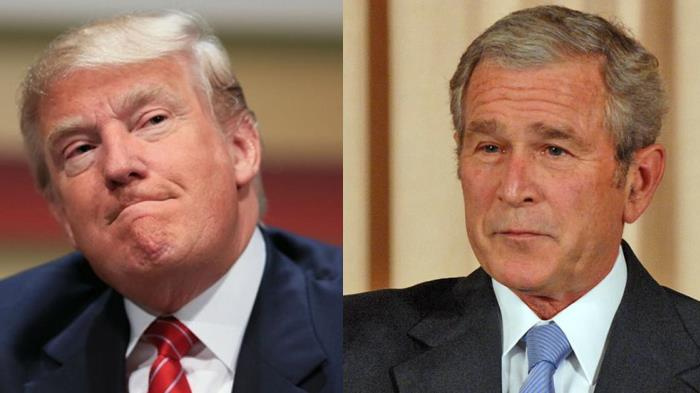Trump and Bush: A Comparison

US President-elect Donald Trump has publicly vowed to "stop looking to topple regimes and overthrow governments." He has also pledged to work with any nation that is genuinely interested in fight against ISIS terrorism. This sounds good and raises some hope that perhaps the US under Trump will shrink from the pattern of foreign intervention and meddling in the domestic affairs of other nations, but the big question is if this is a realistic hope or rather hope against hope?
After all, the previous Republican president, George W. Bush, famously said in the 2000 campaign that "we're not into nation-building" and, yet, using the 9/11 pretext, he ended up as one of the most interventionist US presidents ever and, indeed, in 2004 reluctantly admitted that the US was involved in nation-building in Iraq.
So, naturally, one wonders if Trump, who is full of ultra-nationalistic bombast about "making America great again," will remain true to his public rhetoric, or will he turn out another Bush, who is blamed for a 3 to 6 trillion dollar price tag for US’ messy involvement in "wars of choice, not necessity." Of course, it is simplistic to say that wars are ipso facto bad for the US economy and one must take into consideration the logic of military-industrial complex that breeds conflict in order to satiate its profit motif. This is why the cycle of war often repeats itself and shows its reptilian face in different guises, such as manufacturing crises, which is what both Bush administrations, father and son, excelled in. Look for example at the prologue to the Kuwait crisis: the US deliberately gave misleading 'green light' to Saddam Husain that led him believe US would tolerate his takeover of Kuwait, which proved out to be wrong.
One reason to suspect Trump's ability to remain faithful to his public stance against "regime change" is that it sits uncomfortably next to the other Trump, the militaristic and hawkish politician who has a penchant for US' hard power and has repeatedly criticized the Obama administration for acting indecisively, e.g., in Persian Gulf. Trump's choice of several hawkish retired generals has further reinforced the concern that his administration may turn out to be "trigger happy" and embroil the US in new wars and conflicts irrespective of Trump's focus on improving the domestic economy.
Concerning the latter, Trump's economic blueprint -- of lowering taxes for corporations and the middle class while increasing government spending on defense and infrastructure -- sounds almost like a mission impossible that may actually lead to unfulfilled promises and voter disillusionment, in which case Trump may resort to artificial foreign crises as part of a politics of scapegoating. Unable to take on nuclear Russia and or China, Trump the president may opt for second-tier adversaries such as Iran, in which case he would have to sacrifice US' economic interests reflected in the 16 billion dollar Boeing deal with Iran. Should Trump opt for Rex Tillerson, the Exxon CEO, as his secretary of state, then it is almost a sure bet that Tillerson will prioritize global stability and risk avoidance in US' Middle East policy. But, then again, Tillerson would have to compete with a host of Trump hawks, e.g, Flynn and Mattis and others, favoring a new level of US confrontational approach in dealing with US’ adversaries such as Iran. This would be particularly the case if Trump picks the warmongering ultra-right John Bolton as Tillerson's deputy, sure to cause frictions within the foreign policy establishment from the outset of Trump's administration. Chances are, then, that Tillerson would be the odd man out and left out of key policy decisions, in other words, turned into a figure head. Of course, the opposite possibility also exists, that is, that Bolton would be the scarecrow and ends up frustrated by a duet of Trump-Tillerson singing a different tune on Iran, Russia, and Syria.
While it remains to be seen how US foreign policy under Trump will be shaped and re-shaped by changing global circumstances, it is less uncertain however that just like Bush, Trump may switch to regime change, interventionism, and so on, in the name of political expediency, recalling Bush's flip-flop after 9/11. In fact, US has a long history of "false flags" and manufacturing foreign crises, such as the Gulf of Tonkin (non) incident, which was used by President Johnson in the Vietnam war. With a uniform Republican-dominated Congress and White House, unfortunately it is rather easy for US today to recycle such foreign adventures, which have had calamitous results. History instructs us not to lose sight of important analogies, which is why it is important to keep Bush's example (cited above) in mind when pondering on the true significance of Trump's pledge to pull the US power away from the addiction of regime change abroad.

